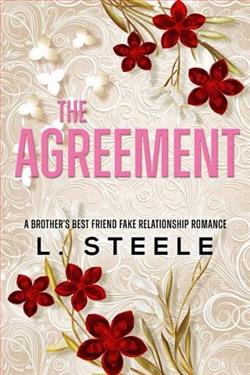Page 44 of Good Graces
I bristle. “You’d rather not deal with me now that you know?”
Davis shakes his head, stepping forward. “No. We still want you. You’re the best,” he says simply. “You’ve always been the best.”
Mancini nods. “And Beckett’s a dog.”
The comment is so quiet, so certain, I don’t know what to do with it. For a second, I feel the sting behind my eyes—the kind that comes when someone unexpectedly believes you, when you didn’t even know you were waiting for it. I blink it back. Swallow it down.
Davis glances at Mancini, then back at me. “We’ll handle him. Get him to drop the tire thing.”
I study them, waiting for the punchline. Waiting for them to laugh, to brush it off, to say something that proves this is still just entertainment to them. But they don’t.
Mancini just exhales, shakes his head. “Fucking dipshit’s gonna ruin his own life sooner or later.”
Davis nods. “Might as well make it sooner.”
And just like that, the round continues. Like I didn’t just lay something bare. Like they didn’t just hear something that should have meant more.
That’s what gets me—not their reaction, not their quiet solidarity. But the knowledge that it won’t stick. That this won’t change anything.
Because at the end of the day, they’re still his friends. And I’m still peripheral. Just another story that will flatten into anecdote. Something they’ll reference once or twice, then forget.
It won’t live in them the way it lives in me.
And I won’t ask it to. Because letting them forget is easier than trying to make them remember.
* * *
I don’t knowwhy I said yes to this.
It’s been two years, and I can count on one hand the number of times I’ve spent time with Alyssa and Jordan outside our apartment. Not because I think it would be a bad time—it wouldn’t. We get along well enough. Keep things easy. Just enough small talk to fill the space, never pushing past the edges of something safe.
I prefer it that way. Surface-level. Simple. I like the kind of connection that doesn’t require work or vulnerability. What I don’t like is the weight of being known.
And yet, when they threw out the invite this morning—one of those casual, throwaway things, a flippanthey, we’re doing happy hour later if you wanna come—I didn’t do what I always do. I didn’t deflect. Didn’t give them my usual,nah, maybe next timeor I’ve got work in the morningorrain check.
I just said,sure.
The second the word left my mouth, their eyes widened, surprised I’d actually said yes. Like the invitation had been more of a courtesy than something they expected me to accept.
They recovered fast, masking it with casual smiles, and I followed suit. Shrugged it off, pretended it was no big deal. Like it wasn’t completely out of character for me to say yes.
Now, hours later, I’m on a bus heading to meet them in the next town over.
They’re like that. Economical girls. City girls. The kind who take public transit without thinking, who thrift their entire wardrobe and know which bars have half-off martinis before six. The kind who can throw together an outfit in five minutes and still look effortlessly pretty.
I can be that girl for one night.
The ride is short, but I still find myself fidgeting. I adjust my bag, check my phone, even though there’s nothing to check. No texts from Wesley, which means he’s fine. Nothing from work. Nothing from—
I shove my phone back into my pocket before I let my mind wander too far.
The bar is tucked onto a quiet street, all glass windows and moody lighting, with a name I can’t remember. Inside, the air smells like citrus and warm bread, and there’s a hum of conversation under the slow, thrumming beat of some indie song I don’t recognize.
Alyssa and Jordan are already at a high-top table near the window, a wooden charcuterie board spread out between them, two nearly empty cocktail glasses on either side.
Jordan sees me first. Her eyebrows lift in slight surprise before she schools her face, smiling. “You made it.”
Alyssa turns. “Damn, I was about to put money on you bailing.”















